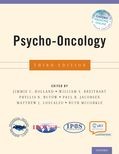 Psycho-Oncology (3 edn)
Psycho-Oncology (3 edn)
Contents
-
-
-
-
-
-
-
-
-
-
-
-
-
-
-
-
-
-
-
-
-
-
-
-
-
-
-
-
-
-
-
Introduction Introduction
-
Defining Spirituality and Meaning Defining Spirituality and Meaning
-
The Impact of Spiritual Well-Being On Psychosocial Outcomes in Advanced Cancer The Impact of Spiritual Well-Being On Psychosocial Outcomes in Advanced Cancer
-
Theoretical Framework Underlying Meaning-Centered Psychotherapy Theoretical Framework Underlying Meaning-Centered Psychotherapy
-
Frankl’s Concepts of Meaning Frankl’s Concepts of Meaning
-
Meaning-Focused Coping Meaning-Focused Coping
-
Other Central Existential Philosophy and Psychology Concepts Other Central Existential Philosophy and Psychology Concepts
-
-
MCP Themes and Formats MCP Themes and Formats
-
Psycho-education Through Didactics and Experiential Exercises Psycho-education Through Didactics and Experiential Exercises
-
Incorporating Basic Existential Concepts and Themes Incorporating Basic Existential Concepts and Themes
-
Administration of Meaning-Centered Group Psychotherapy Administration of Meaning-Centered Group Psychotherapy
-
Administration of Individual Meaning-Centered Psychotherapy Administration of Individual Meaning-Centered Psychotherapy
-
-
Research Demonstrating The efficacy of MCP Research Demonstrating The efficacy of MCP
-
Future Directions Future Directions
-
References References
-
-
-
-
-
-
-
-
-
-
-
-
-
-
-
-
-
-
-
-
-
-
-
-
-
-
60 Meaning-Centered Psychotherapy
Get access-
Published:February 2015
Cite
Abstract
Clinicians who care for advanced cancer patients recognize that assisting patients with sustaining a sense of meaning in the face of death is often critical to their overall sense of spiritual well-being and quality of life. This chapter describes a brief manualized intervention, meaning-centered psychotherapy (MCP), designed to help patients with advanced cancer sustain or enhance a sense of meaning. Itprovides an overview of research on the link between spiritual well-being and psychological adjustment, then describes the theoretical rationale for MCP and provides an overview of the intervention content and session goals. Findings from randomized controlled trials of both individual and group formats of MCP demonstrating the efficacy of the intervention in enhancing meaning in advanced cancer patients are presented. It concludes by briefly discussing ways in which work on MCP will be carried forward, through dissemination and training efforts and through research to adapt the intervention for other populations.
Sign in
Personal account
- Sign in with email/username & password
- Get email alerts
- Save searches
- Purchase content
- Activate your purchase/trial code
- Add your ORCID iD
Purchase
Our books are available by subscription or purchase to libraries and institutions.
Purchasing information| Month: | Total Views: |
|---|---|
| October 2022 | 3 |
| December 2022 | 3 |
| January 2023 | 2 |
| February 2023 | 4 |
| March 2023 | 4 |
| April 2023 | 1 |
| May 2023 | 1 |
| June 2023 | 2 |
| July 2023 | 2 |
| August 2023 | 2 |
| September 2023 | 2 |
| October 2023 | 2 |
| November 2023 | 2 |
| December 2023 | 3 |
| January 2024 | 1 |
| February 2024 | 1 |
| March 2024 | 2 |
| April 2024 | 3 |
| May 2024 | 1 |
| June 2024 | 4 |
| July 2024 | 3 |
| August 2024 | 1 |
| December 2024 | 2 |

Get help with access
Institutional access
Access to content on Oxford Academic is often provided through institutional subscriptions and purchases. If you are a member of an institution with an active account, you may be able to access content in one of the following ways:
IP based access
Typically, access is provided across an institutional network to a range of IP addresses. This authentication occurs automatically, and it is not possible to sign out of an IP authenticated account.
Sign in through your institution
Choose this option to get remote access when outside your institution. Shibboleth/Open Athens technology is used to provide single sign-on between your institution’s website and Oxford Academic.
If your institution is not listed or you cannot sign in to your institution’s website, please contact your librarian or administrator.
Sign in with a library card
Enter your library card number to sign in. If you cannot sign in, please contact your librarian.
Society Members
Society member access to a journal is achieved in one of the following ways:
Sign in through society site
Many societies offer single sign-on between the society website and Oxford Academic. If you see ‘Sign in through society site’ in the sign in pane within a journal:
If you do not have a society account or have forgotten your username or password, please contact your society.
Sign in using a personal account
Some societies use Oxford Academic personal accounts to provide access to their members. See below.
Personal account
A personal account can be used to get email alerts, save searches, purchase content, and activate subscriptions.
Some societies use Oxford Academic personal accounts to provide access to their members.
Viewing your signed in accounts
Click the account icon in the top right to:
Signed in but can't access content
Oxford Academic is home to a wide variety of products. The institutional subscription may not cover the content that you are trying to access. If you believe you should have access to that content, please contact your librarian.
Institutional account management
For librarians and administrators, your personal account also provides access to institutional account management. Here you will find options to view and activate subscriptions, manage institutional settings and access options, access usage statistics, and more.